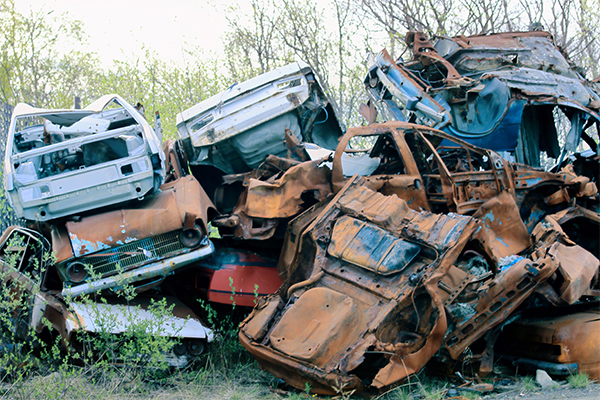Removing VOCs from air emissions during vehicle shredding
Regulations around air quality are becoming ever stricter in many regions, prompting companies to seek new, reliable purification solutions. In Belgium, as in the rest of Europe , the spotlight has now been placed on the vehicle shredding sector. DESOTEC’s mobile filters can be installed rapidly, making them ideal for firms who must meet a tight deadline for more stringent emissions limits.
The problem
As vehicles comprise many parts, the shredding process emits a wide range of compounds. These include volatile organic compounds (VOCs) such as benzene, toluene, ethylbenzene, and xylene (BTEX), hydrocarbons, and solvents from coatings and paints.
The new legislation in Belgium sets a very low emission limit for automotive shredding (20 mg/m³ total organic carbon (TOC)). Firms face additional restrictions on other compounds including phthalates, polychlorinated biphenyl (PCB), polybrominated diphenyl ethers (PBDE), and various metals.
The challenge is made tougher by the fact that flow rates in this sector are often large, ranging from around 60,000 m³/h to more than 100,000 m³/h. Finding a technology that can handle such air streams while also heavily reducing TOC is not easy.


The solution
DESOTEC’s largest Aircon V-XL filter models can each handle a flow rate of between 5,000 and 55,000 m³/h. By installing several filters in parallel, our system has the capacity to treat larger flow rates.
Our filters contain activated carbon, which adsorbs any VOCs and many other contaminants that are passed across the filter bed. For vehicle shredding applications, we often use a specially impregnated carbon type to capture a higher number of molecules.
To prevent the filter from becoming clogged, it’s important to protect it from dust and moisture, which are both common in shredding processes. Therefore, pre-treatment with technology such as cyclone filters, wet or air scrubbers, ultrafilters, and dehumidifiers may be required.
DESOTEC’s engineers have the experience and expertise to analyse process parameters, and tailor filtration set-ups to each company’s unique requirements.
The results
DESOTEC filters are now working well at many shredding companies across Europe.
When the filters become saturated, exchange is quick and easy, taking on average just half an hour and keeping business disruption to a minimum.
Filtration waste is then transported in closed filter units away from clients’ sites and taken to DESOTEC’s facilities for safe handling. All molecules that were adsorbed on the carbon are destroyed in our furnaces, which are monitored to ensure that only water vapour exits the chimney. Wherever possible, carbon is reactivated, keeping customers’ costs down and boosting their sustainability.
DESOTEC’s solutions for the shredding sector
Our expert engineers are happy to discuss how our mobile activated carbon filtration solutions could work at your company. Give us a call or drop us an email today.
Contact our expertsDESOTEC’s solutions for the shredding sector
Our expert engineers are happy to discuss how our mobile activated carbon filtration solutions could work at your company. Give us a call or drop us an email today.
Contact our experts-
Air & gas purification
Our sustainable filtration solutions ensure air purification, odour control, and high quality process gases such as biogas and biomethane. -
Our unique service
Our closed-loop, full-service model is as unique as your business needs. We’ll define the right filtration setup and safely recycle filtration waste, making it easy to go green. -
Your sustainability journey
We care about protecting our air, water and soil for future generations, just like you. Our filtration solutions help you meet environmental standards, reducing your carbon footprint.


